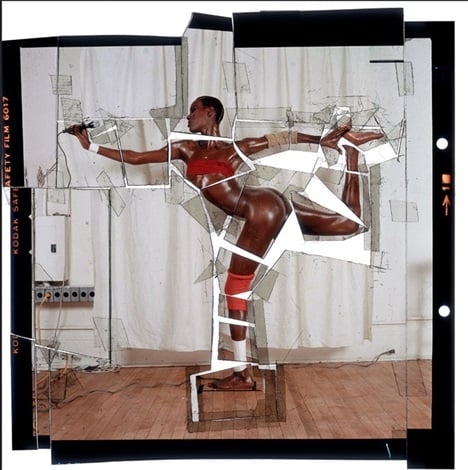
Image: Courtesy artnet.
Grace Jones, A One Man Show.
Image: Courtesy the Kitchen.
“From the very beginning I was going against the grain and making trouble,” Grace Jones says in her contentious book co-written with author Paul Morley, I’ll Never Write My Memoirs.
Monday night at the Kitchen in New York, Dirty Looks queer film series screened Jones’s 1982 music video collection A One Man Show to a sold-out crowd. The video makes its Los Angeles debut Friday, February 12 at the Standard hotel. It so happens that the only copies in existence of Jones’s collaboration with her erstwhile lover and photographer Jean-Paul Goude are on VHS, Dirty Looks founder Bradford Nordeen explained, so the video was a throwback not only in terms of music, but of technology as well.
Another throwback was the video of voguing performers, care of Rashaad Newsome, which opened the event—and which most of the audience ended up talking over. At this point, Newsome’s peddling in black female and gender variant bodies is treading on well-worn territory, especially when compared to Jones’s electric performances from over three decades ago.
Tavia Nyong’o, a cultural critic and performance studies professor at New York University, introduced A One Man Show with a few words on Jones’s prolific and enduring output, calling her work the “performance art of the nightclub.” Jones is often relegated to the status of performer rather than artist, which is a shame. Viewing her work under the lens of art thus becomes an act of historical correction. She is, as Nyong’o explains, concerned with “the art not just of the body but of the flesh,” confronting “not the ease, but the ardor, of being yourself.”
Through her work with her body, a body that has been historically and violently commodified, Jones “found her own canon of outrage,” as Nyong’o states. This can be seen in flashes of anger as Jones commands the stage, besuited and waltzing across hard surfaces with unforgiving stilettos, or, conversely, barefoot. She glances at the audience below, then glares. There is power in this gaze, which is the gaze of a woman who is not taking any shit anymore.
Sometimes Jones lifts up her sunglasses for emphasis, but a lot of times she prefers to leave them on. It’s her show, after all. We’re just invited for a night to witness her power.
A One Man Show screens Friday, February 12 at 7 p.m. at The Standard, Downtown LA, in tandem with the LA Art Book Fair.